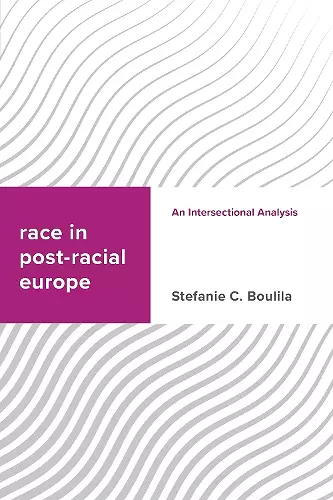Race in Post-racial Europe
An Intersectional Analysis
Format:Hardback
Publisher:Bloomsbury Publishing PLC
Published:7th Aug '19
Currently unavailable, and unfortunately no date known when it will be back

How can we make sense of race in Europe? In public discourse, race is understood as an outdated concept and as a reminiscence of a past that has been overcome. Drawing on intersectional feminist theory and a rich selection of examples from political and cultural discourse, Race in Post-Racial Europe provides a unique insight into how gender and racial inequalities are maintained through the claim of being beyond them.
As Europe is witnessing a new era of racial denial, Boulila (Lucerne Univ. of Applied Sciences and Arts, Switzerland) provides valuable insights into European gender and racial inequalities that persist despite claims that they no longer exist. In her rigorous, thoughtful, and witty analysis, she questions how race operates in European democracies—especially with respect to sexual preferences. The author convincingly argues that the denial of "race" as a category has made it almost impossible to account for how "race" is used as a mechanism for social and political control. As she astutely observes, it is European "liberals" who have called for the implementation of tougher rules for immigrants and an end to multiculturalism. Particularly notable are chapter 1 ("Contesting European Racial Denial"), which explores the history of race denial in Europe; chapter 3 ("Racing Post-feminism"), which examines the political grammar of post-racialism and post-feminism in Europe; and chapter 7 ("But We Are All Different! Diversity and the Depoliticization of Anti-Racism"), which looks at the appeal of diversity in post-racial Europe. Boulila's final chapter, "Resisting Intersectionality," posits that intersectionality is a dangerous idea because it would necessitate changes to basic political and epistemological assumptions. Summing Up: Recommended. Lower-division undergraduates through faculty. * Choice Reviews *
From astute observations of Meghan Markle and the multicultural monarchy, to the spectre of ‘monstrous’ Muslim women, Boulila brilliantly captures the political zeitgeist of the post-race moment with a rigorous and witty analysis that slices into the racism, sexism and Islamophobia that fuels the seductive common-sense political popularism sweeping Europe. A powerful and eloquent read that lifts the fog so we can see the truth! -- Heidi Safia Mirza, Professor of Race, Faith and Culture, Goldsmiths, University of London; Co-editor of Dismantling Race in Higher Education: Racism, Whiteness and Decolonising the Academy (Palgrave McMillian)
In this book Stefanie C. Boulila makes a persuasive and compelling argument: we need the analytical category of race to explain the post-racial imaginary. Informed by a sustained engagement with Black feminist and feminist of colour thought, this book shows us the value of intersectionality and other terms that are often dismissed because they are dangerous. Boulila's new book will become a key text in what she calls "a growing archive of unruly knowledge." -- Sara Ahmed, feminist writer and independent scholar
Boulila’s succinct demolition of the myth that these are post-racial times is a model of critical writing. Starting from the apparently happy moment of Meghan and Harry’s wedding, she is soon evidencing ways that ‘post-racial discourses’ have been promoted ‘as a means to displace antiracist claims’ and to disavow ‘the significance of race’. ... [Boulila's] well-evidenced insistence that ‘critical engagements need to hold on to strong definitions of inequalities that account for power relations and histories of subjugation’, and her view that race remains a crucial analytical category, are amongst the reasons that this book deserves to be widely read. * Process North *
ISBN: 9781786605573
Dimensions: 228mm x 161mm x 21mm
Weight: 454g
190 pages